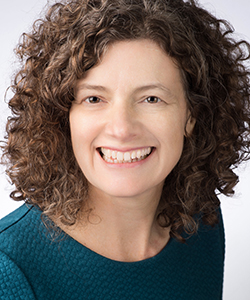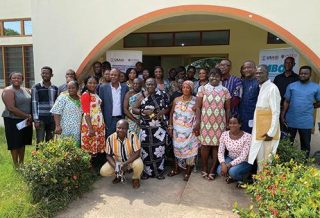VOICES
Here We Go
A daily practice of reflection can extend our learning.
By Tracy Crow
Categories: Continuous improvement, Learning designsOctober 2017
Vol. 38 No 5
While I’m excited that the focus of this issue — Reflecting on Practice — allows us to explore the many opportunities educators have to take a close look at how they teach, I want to flip that phrase and consider what it means when we practice reflecting.
The pace of this 24/7 world doesn’t lend itself to reflection, yet we’re more in need of the practice of reflection than ever. Reflection is an opportunity to make meaning of what we experience, and without explicit attention to its practice, experiences can flow by and be quickly forgotten as the next priority pops up. The Standards for Professional Learning include reflection as a critical part of the Learning Communities standard, within the cycle of continuous improvement; within the Learning Designs standard, where reflection is often part of effective learning strategies; and in the Implementation standard, where reflection is a critical form of feedback for self and others.

What might the practice of reflection look like in a busy professional’s work week? Here are a few strategies to consider:
Reflection as an element of planning: As you make your to-do list for the day or week, build in time — even as little as five minutes — at the beginning and end of each day to make note of how you spent your time, where you were successful, what you might celebrate, where you found unexpected challenges or surprises, and what you learned. A couple of minutes of reflection at the beginning of your day allows you to remind yourself of lessons learned as you look ahead to the day’s priorities.
Reflection as part of conversations or meetings: While careful agendas and team norms help to make a group’s collaborative work more productive, time for reflection at the end of meetings can help a team function at higher levels as well as serve as reminders of promises made. Reflection might be as simple as asking whether the team followed its norms and where it might need to improve in the future, or asking team members to share a question or feeling they have as they leave.
Reflection on new information: Many learning designs build in reflection as an integral part of a learning experience. Taking time to reflect after reading an article, engaging in a facilitated meeting, or watching a video can help learners make their thinking explicit and raise questions for themselves or others. For some learners, writing in a journal may serve this purpose well. For others, a two- or three-way conversation might be a valuable way to extend their learning. Debriefing with others can bring new perspectives to consider and open learners’ eyes to new understandings.
We invite you to find other ways of practicing reflection throughout this issue of The Learning Professional. We’re also eager to hear what works for you! Please get in touch any time.
Special note to readers: We apologize for the delay in your member publications while we experience staffing transitions. We said goodbye recently to Eric Celeste as editor of The Learning Professional and we look forward to what comes next.
Special note to readers: We apologize for the delay in your member publications while we experience staffing transitions. We said goodbye recently to Eric Celeste as editor of The Learning Professional and we look forward to what comes next.

Tracy Crow served as chief strategy officer for Learning Forward.
Categories: Continuous improvement, Learning designs
Recent Issues
WHERE TECHNOLOGY CAN TAKE US
April 2024
Technology is both a topic and a tool for professional learning. This...
EVALUATING PROFESSIONAL LEARNING
February 2024
How do you know your professional learning is working? This issue digs...
TAKING THE NEXT STEP
December 2023
Professional learning can open up new roles and challenges and help...
REACHING ALL LEARNERS
October 2023
Both special education and general education teachers need support to help...










